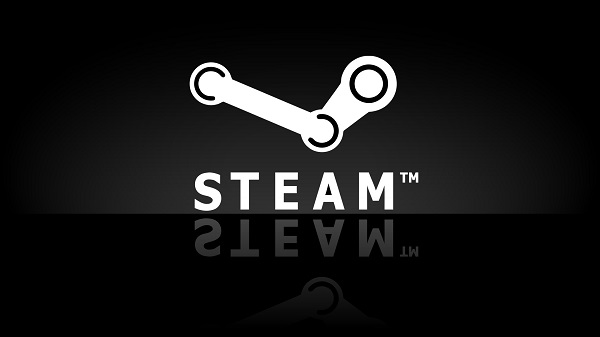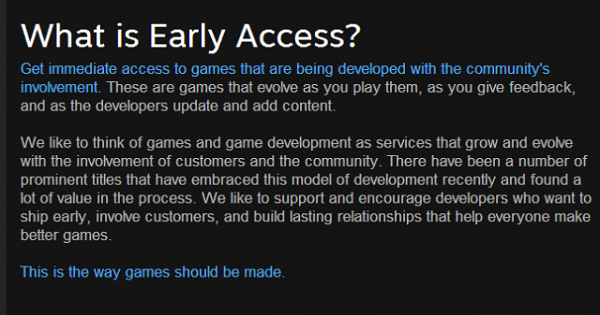In what will come as a surprise to very few who have followed the early access scene in recent months, Valve has issued an updated list of rules developers are expected to follow when part of Steam’s Early Access programme. These include:
- Clear branding as Early Access of games when Steam keys are being distributed offsite;
- Communication of the current status of a project;
- Projects are to be launched on Early Access the same time as they’re unlocked on other storefronts or sites;
- Developers cannot charge more on Steam than they charge elsewhere;
- Avoidance of ‘specific promises about future events’.
Though these new rules seem to put a lot of focus on what developers do elsewhere, it’s clear that Valve have finally recognized the problems that Early Access has created on their own service. It’s been a rough first year for the programme with several high-profile projects collapsing while still nowhere near release. While initial messaging from Valve suggested that they wanted to distance themselves from how these projects progress, it’s not hard them viewing with concern the recently published EEDAR analysis reporting that well under half of all Early Access games ever make it to full release.
It’s certainly a step in the right direction, though in the absence of any real deadlines raised against developers one has to wonder how much this is a Band-Aid on an open wound. At the very least, it’s a sign that Steam is showing a willingness to monitor crowdfunded games on their service to some extent, and is welcome in a week where Frontier Developments have taken a huge amount of heat for canning Elite: Dangerous‘s Offline Mode. While creator David Braben has explained that the dynamic system used to update astronomical and market data in the game has led to the need for continuous, minimal online connection, the problem that this has created is twofold. First, Offline Mode was promised by Frontier in the game’s original Kickstarter campaign, and secondly, the announcement has been made barely a month before the game’s full release on December 16th.
 Personally speaking, this is a hard one on which to comment. As many of you will know, I’ve become quite the fan of Elite: Dangerous, and have particular praised Frontier in the past for what has up until now been a well-judged, and refreshingly subtle, approach to the game’s PR. While I can fully see why they would regard constant connection as crucial to the experience (It will still offer Solo Mode, which keeps the dynamic universe updated but does not include other players) leaving the announcement so late is at the very least a horrible miscalculation promotionally-speaking, and you can understand why a lot of the early backers would object to the removal of a feature that was promised in the Kickstarter. Many people mistrust ‘always online’ games, making the capacity to be played sans internet connection a vital trait for many consumers.
Personally speaking, this is a hard one on which to comment. As many of you will know, I’ve become quite the fan of Elite: Dangerous, and have particular praised Frontier in the past for what has up until now been a well-judged, and refreshingly subtle, approach to the game’s PR. While I can fully see why they would regard constant connection as crucial to the experience (It will still offer Solo Mode, which keeps the dynamic universe updated but does not include other players) leaving the announcement so late is at the very least a horrible miscalculation promotionally-speaking, and you can understand why a lot of the early backers would object to the removal of a feature that was promised in the Kickstarter. Many people mistrust ‘always online’ games, making the capacity to be played sans internet connection a vital trait for many consumers.
It also raises the question of whether features promised and technically supplied while a Kickstarter campaign is active (or any crowdfunding campaign for that matter), still hold water at later stages when the project has moved on to other models. Strong arguments can be made both ways, and it simply highlights the huge unexplored grey areas that remain unexplored in the crowdfunding realm. Valve’s new rules for Steam Early Access represent a mild prod at these grey areas, but it can’t be denied that there’s a long way to go.

